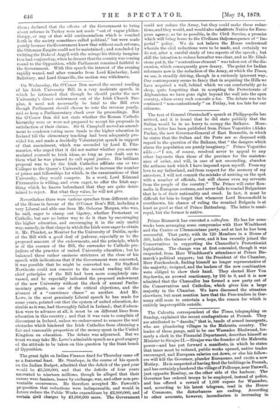Nevertheless there were various speeches from different sides of the
House in favour of the O'Conor Don's Bill, including a very Liberal and able one from Mr. Osborne Morgan, who was, he said, eager to stamp out bigotry, whether Protestant or Catholic, but saw no better way to do it than by encouraging the higher education, and encouraging it in the only useful way, namely, in that shape in which the Irish were eager to obtain it. Mr. Plunket, as Member for the University of Dublin, spoke of the Bill with a good deal of jealousy, especially as to the proposed amount of the endowments, and the principle, which is of the essence of the Bill, the surrender to Catholic pre- judices of the practice of united University education; but he balanced these rather ominous strictures at the close of his speech with indications that if the Government were converted, it was possible that he might be converted too. Sir Stafford Northcote could not consent to the second reading till the chief principles of the Bill had been more completely can- vassed, and he especially indicated the proposed endowment of the new University without the check of annual Parlia- mentary grants, as one of the critical objections, and the absence of a "conscience clause" as another. And Mr. Lowe, in the most genuinely Liberal speech he has made for some years, pointed out that the system of united education, de- sirable as it was, had thoroughly failed in Ireland ; that if educa- tion were to advance at all, it must be on different lines from education in this country ; and that it was vain to complain of discontent in Ireland, unless we endeavoured to remove the real obstacles which hindered the Irish Catholics from obtaining a fair and reasonable proportion of the money spent in the United Kingdom on education. The debate was adjourned. But we trust we may take Mr. Lowe's admirable speech as a good augury of the attitude to be taken on this question by the front bench of Opposition.


































 Previous page
Previous page